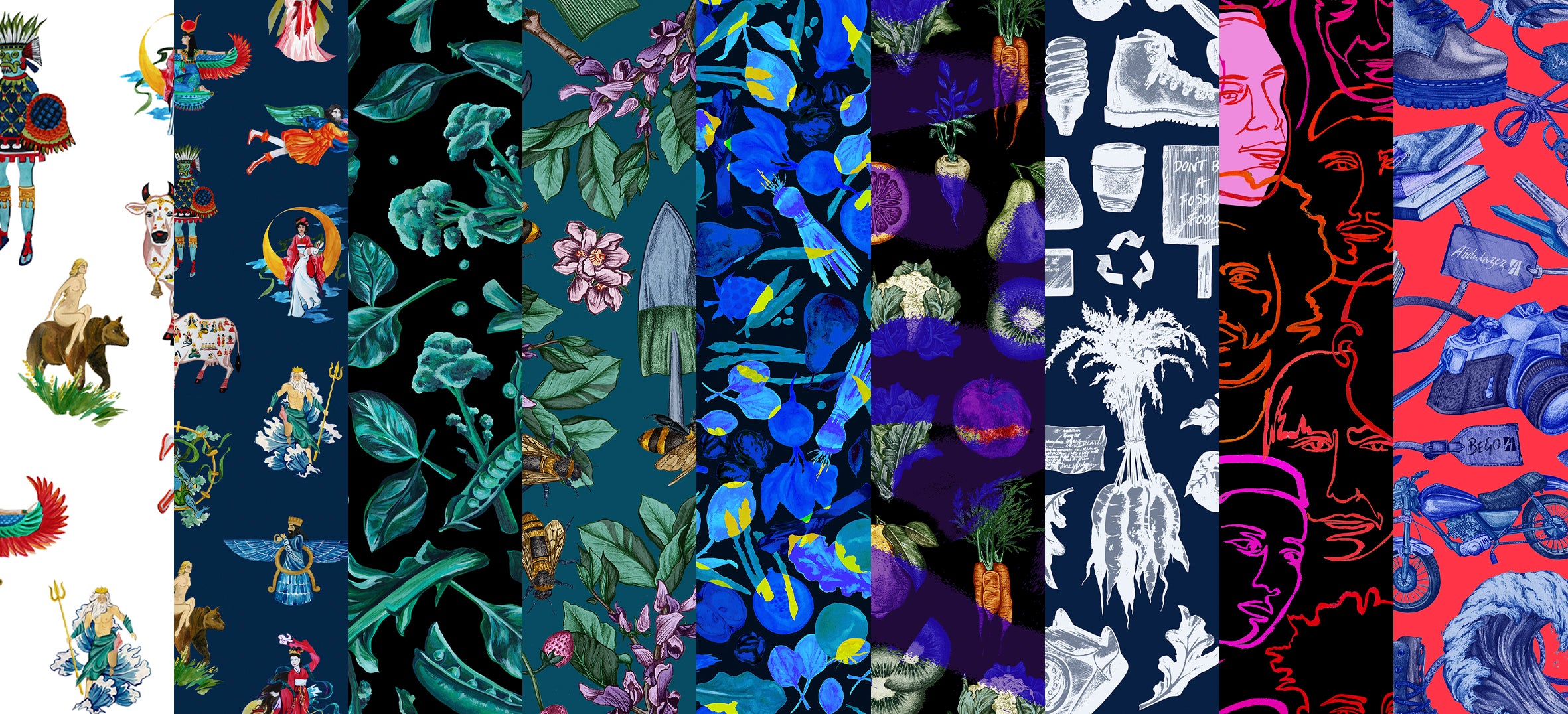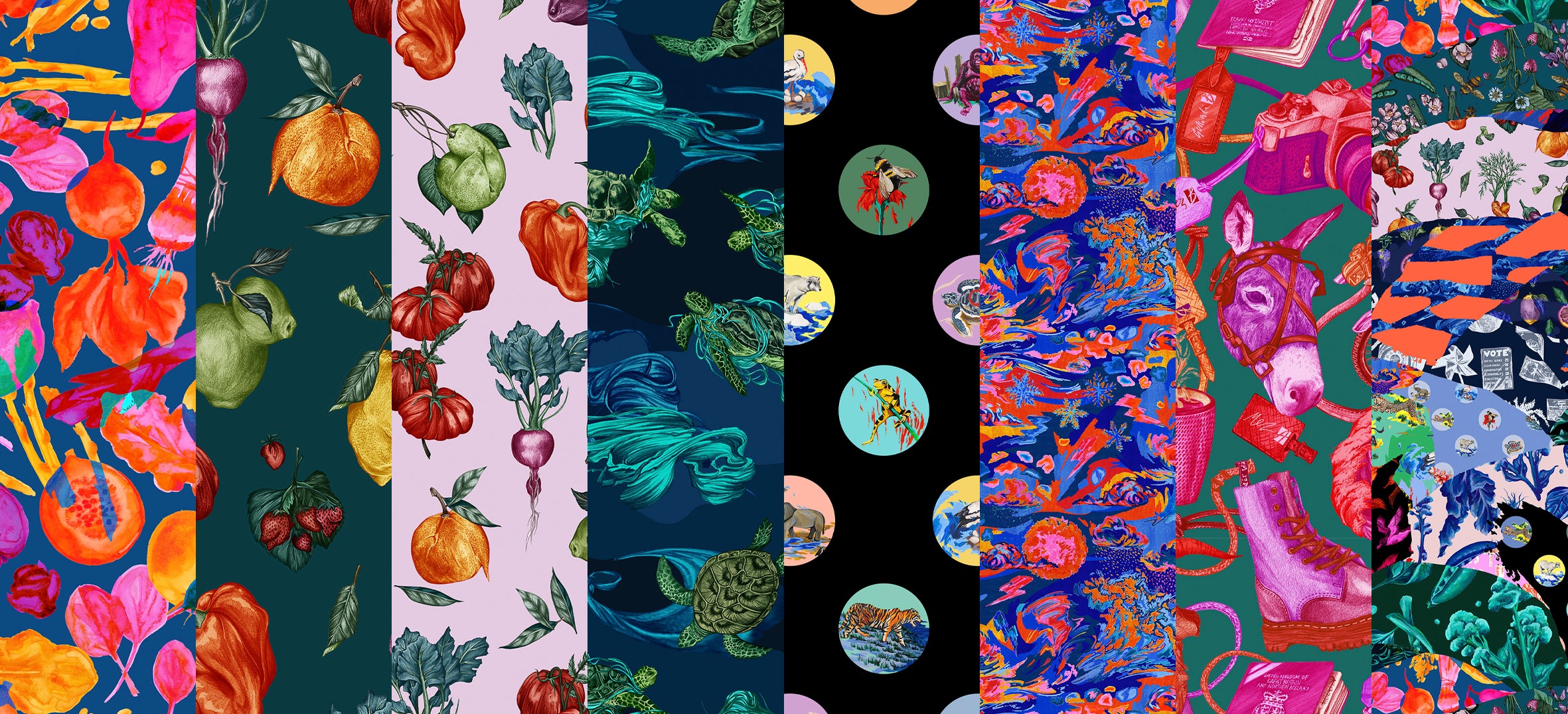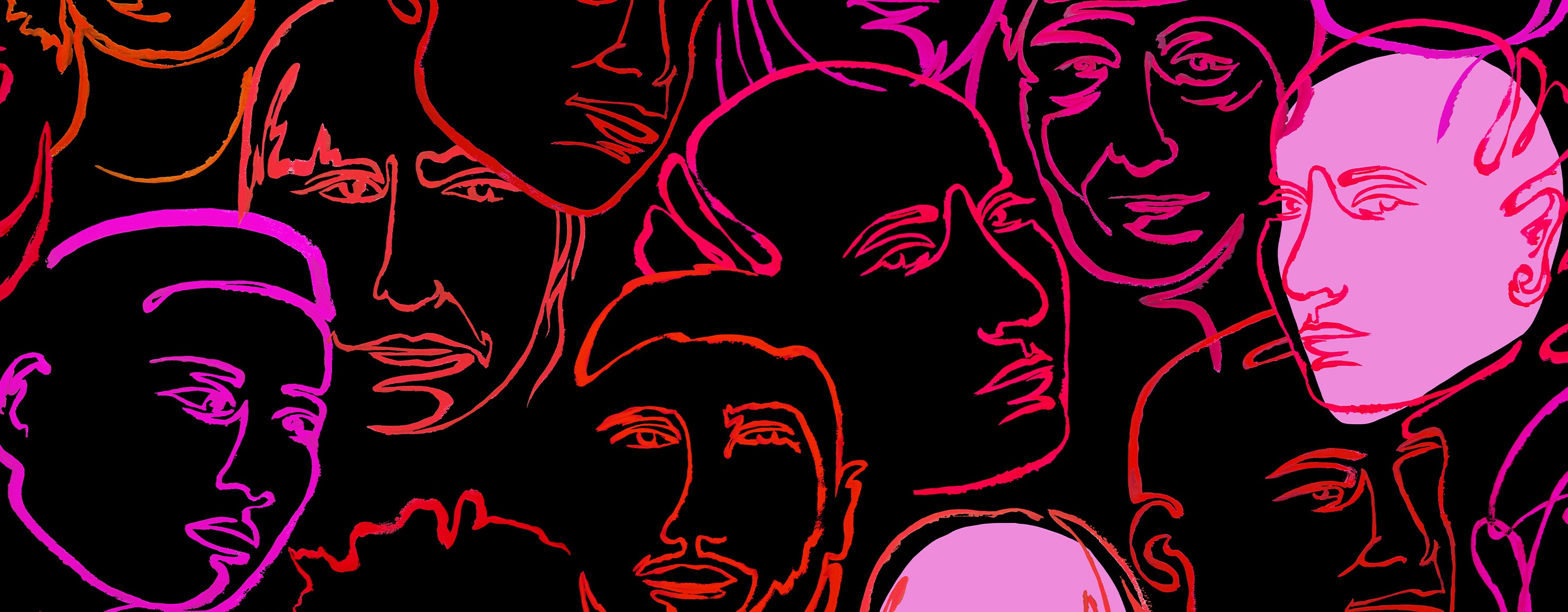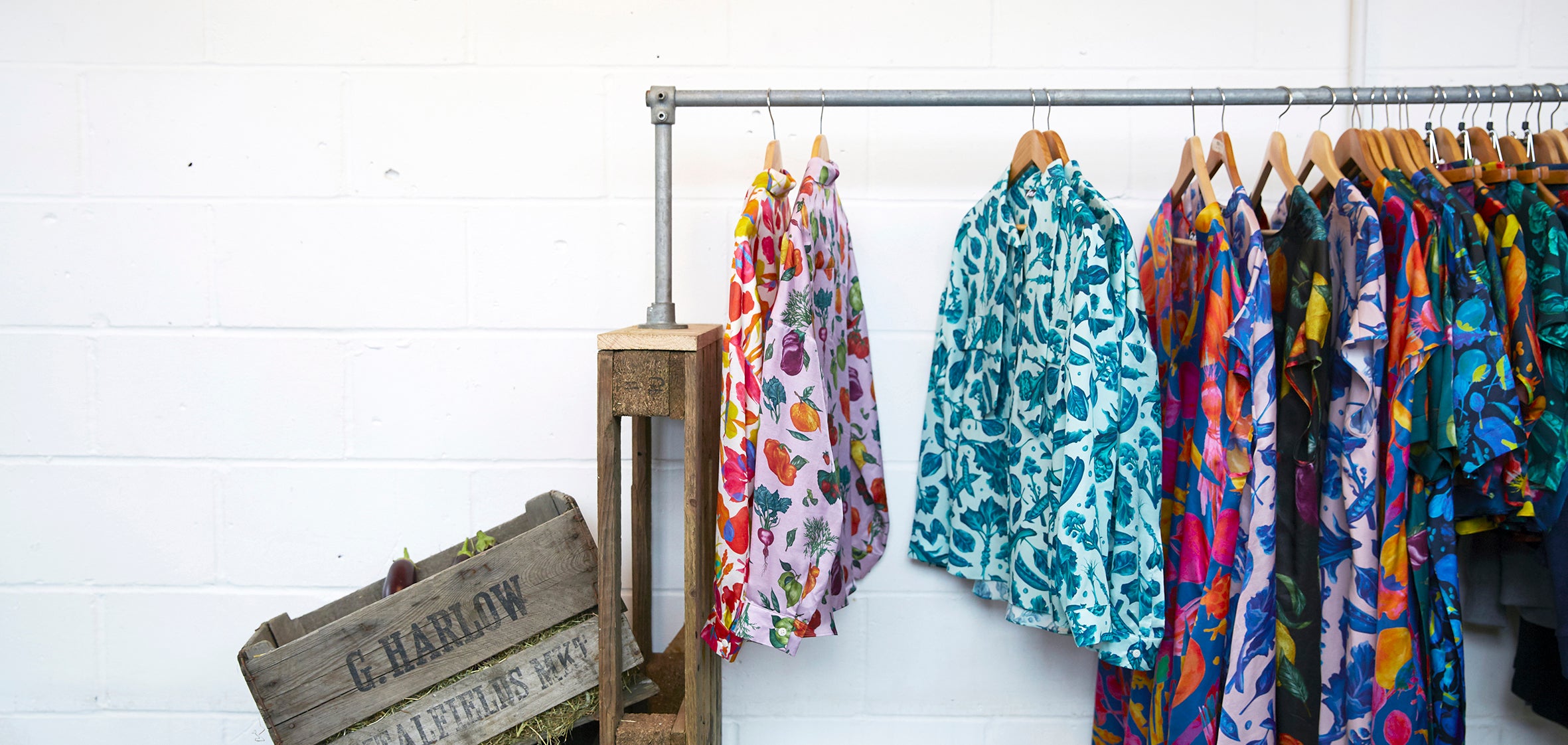Organic Cotton Hemp Prints

Each of our prints are designed to start conversations around a current issue. Here is a snippet of each of the prints in our Organic Cotton Hemp range so you can wear the one that matches your passion as well as looking fabulous!
Here's a link to the Regenesis range too (they aren't the same).
Read more about which fabric is for you here.
Our garments come with a talking point minizine that explains the issue you are wearing, why it is important and what you can do to help. This way the next time someone compliments your outfit, you can talk about your passion without the preach. 10% of our profits go back to a charity that works with that issue you’re wearing.
Renewable - Harnessing the power of the planet
From the dawn of time, humans have been obsessed with harnessing the power of the planet. This renewables print showcases different examples of deities and gods that utilise the natural elements. Switching to renewable energy is the most sustainable change we can do right now.
Demand for natural resources is at an all-time high and continues to grow- for food, clothing, water, housing, infrastructure and other aspects of life. The International Energy Agency (IEA) expects that worldwide energy consumption in 2040 will have increased more than a quarter and that the goal, set in the Paris Agreement to limit climate change, will not nearly be reached.
This print includes: Neptune the Roman god of freshwater, Isis the Egyptian goddess of the sea, Tlaloc the Aztec rain god, Mazu 媽祖 the Chinese goddess of the sea, Boreas the Roman god of the North wind, Raijin 雷神 the Japanese god of thunder, lightning, and storms, Medeina the Lithuanian ruler of forests, trees and animals, Kamadhenu the Hindu mother of all cows (and the earth), Frigg the Viking goddess of the sky, Ahura Mazda the Persian king of gods, Amaterasu Ōmikami the Japanese sun goddess and Chang'e 嫦娥 the Chinese goddess of the moon.
Plant Based Protein
This print heroes the very best protein greens: Broccoli, Peas, Beans, Kale, Sprouts, Artichoke and Spinach. These beautiful veggies are packed full of protein and mean you can easily move away from meat with every meal.
“But where do you get your protein from?”
One of the most common misconceptions about cutting down your meat intake is that you can’t get enough protein. What a load of bull! A food that contains all essential amino acids is considered a complete protein source. Many of the complete protein sources are animal products; however, in 2016 the Academy for Nutrition and Dietetics stated it is easily possible to get complete protein by eating only plant-based foods. The next time someone asks that silly protein question, you’ll have a whole load of supergreen ammunition.
Precious Insects
This print showcases the beautiful bees alongside the gardening tools and plants that they thrive on. We encourage getting wild, providing the right plants for the incredible insects that help pollinate the crops and biodiversity that helps our ecosystem survive.
Over ¾ of wild flowering plant species in temperate regions need pollination by insects to develop their fruits and seeds fully. Without them, it would cost farmers at least £1.8 billion a year to hand pollinate crops. According to global monitoring data, there has been a 45% decline in insect populations over the past 40 years. The ubiquitous use of chemical pesticides, wild habitat destruction and changes in crops being grown are the chief contributors to this decline. The top 5 recommended bee attracting plants are: Viper’s Bugloss, Foxgloves, Lavender, Beans, and Crocus.
Eating Seasonally
This print is colour coded light to dark, Spring, Summer, Autumn, Winter. No matter the colourway, this piece showcases the inherent beauty of fresh, seasonal produce and acts as a guide of what to eat and when.
Less than 1 in 10 brits know when the UK’s most popular fruit and veg is in season. The UK imports half of its vegetables and nearly 90% of its fruit. What’s more scary is that in the winter, Europe sources 80% of its fresh produce from one region in southern Spain. We’re spoilt for choice, and have become accustomed to buying whatever we want, when we want.
Pesticide
At first glance it's deliciously fruity, but look a little closer for a visual representation of the safer fresh produce. The more spray passing through the illustration, the higher the amount of pesticide residues found on that type of produce when not shopping organically.
Right from the start of our lives and often without knowing, we are ingesting a large amount of chemicals. Pesticides are now in most products, and out of all the produce tested by The Expert Committee on Pesticide Residues in Food, the ones that tested with the highest residues were; Beans with pods, Okra, Rice, Poultry meat and most shockingly, infant formula. It is essential that we have the facts on what we are releasing not just into the environment, but our own bodies! Illustrated in the print from the latest government report from The Expert Committee on Pesticide Residues in Food are a whole host of different produce that contains residues at or below the maximum residue limit: Cauliflower 14% Carrots 26% Kiwi fruit 47% Peppers 50% Lettuce 53% Apples 80% Parsnips 87% Oranges 93% Pears 93% Cherries 95% and Lemons and limes 96%.
Action
Designed to inspire change in the everyday, these beautiful hand drawn illustrations showcase the simple actions we can take to make a difference. From eating more plant based and wrapping up warm, to reconsidering our energy suppliers and voting for change, these everyday actions make being a climate activist a walk in the park.
Climate change is happening now. Our everyday choices play a big part in why it is happening, but also how we can help make a difference and change the course we are on. Although you’re just one person, the size of your carbon footprint (the amount of greenhouse gas emissions attributable to you) may surprise you. Nearly everyone produces several tonnes of greenhouse gases each year. The average UK carbon footprint was calculated as 8.34 tonnes, per person in 2017. That’s the equivalent of 8 football pitch sized balloons. Research has shown that a British citizen emits more CO2 in two weeks than some people in Africa do in a year. It’s time to be responsible for our actions. By not only reducing your own footprint, taking steps like these influence the people around you, whilst showing industries there is an appetite for change.
1/10
1/10 people will be displaced by 2050 - a truly shocking statistic. This print showcases 10 individuals that have lived experience of displacement and are friends of The Worldwide Tribe podcast, Asylum Speakers. Every 10th portrait is highlighted in order to visually represent how many people will be affected. Join us and learn from these wonderful individual’s stories - each one completely unique.
The Institute for Economics and Peace (IEP), projected that as many as 1.2 billion people around the world could be displaced by 2050. The global population currently stands at 7.8 billion. That number is expected to reach 10 billion by 2050, straining the world's already stretched natural resources. The actions we take day to day will have a huge impact on other people’s lives, especially with so much displacement from climate change. It is our responsibility to take ownership of our impact and strive to not only create less mess, but a positive future - for those all around the world. We must demand social change and a new way of thinking. Let’s be inclusive, not exclusive.
Stories
This print weaves together individual stories, highlighting the people behind the statistics with lived experience of displacement. Each individual chose two objects; something that represents their previous home (object A), and something that represents their life now (object B). A firm favourite in the Gung Ho classic illustration style - empower yourself with truly inspiring journeys, each completely individual and unique.
According to UNHCR, The UN Refugee Agency, there are now over 80 million people forcibly displaced, of which 26 million are refugees. These huge numbers are overwhelming and, to be able to process them, a lot of the time we tend to think of them only in terms of statistics, rather than people. Each person in these scary statistics is someone just like you or me who has had to undergo serious trauma to leave their lives behind and try to find somewhere safe. These stories are incredibly moving, and by wearing this print you are channelling not only their journeys, but more importantly their incredible attitudes to life. Learn with us and embrace new people and experiences in order to create the change needed for a better future for all. Let’s be part of the change, not avoid it.



